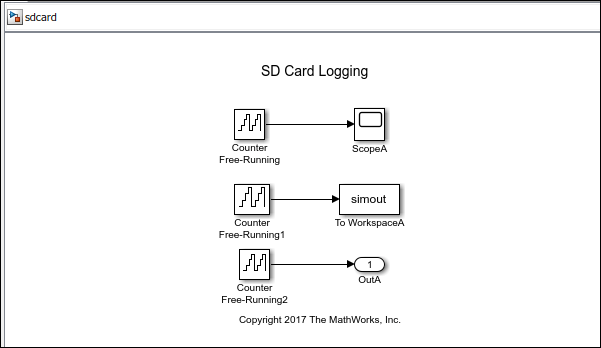Log Signals on SD Card
You can use SD card logging to save signals from Simulink® models on an SD card mounted on
STM32F746G-Discovery target hardware. The signals from these
models are saved as data points in MAT-files. With the data you log, you can apply fault
analysis, search for transient behavior, or analyze sensor data collected over a long
period of time. The data points can be saved in: Structure,
Structure with time, or Array format.
Simulink supports logging signals on the
target hardware from only these three blocks:

Without MAT-file logging on SD card, you can only log and analyze data on the target hardware through External mode or by sending the signal to a computer (using Serial, UDP, or TCP) and storing it in MATLAB®. These mechanisms need an active connection between a computer and the target hardware when logging data. With SD card logging, you can log data without any need to connect the target hardware to the computer. Other advantages of logging data to SD card over other mechanisms are:
The ability to collect data over a long duration for analysis.
The ability to store the data in a well-structured MAT-file, including timestamp information.
Before you start to save signals from Simulink models on an SD card, complete the steps listed in Prerequisites for Logging Signals.
Enable MAT-file Logging: To save MAT-files on an SD card, the MAT-file logging option in the Configuration Parameters dialog box must be selected.
Configure Model to Log Signals on SD Card: SD card logging is supported in models containing To Workspace, Scope, or Outport blocks. You must specify the values for several block parameters.
Run Model on Target Hardware: Simulink deploys code and logs signals on the SD card. These signals are saved as MAT-files on the target hardware.
Import MAT-Files into MATLAB: After logging is complete, you can open MAT-files in MATLAB and use them for further analysis.
See Also
Topics
- MAT-file Logging on SD Card for STMicroelectronics STM32 Processors (Embedded Coder)
- Prerequisites for Logging Signals (Embedded Coder)
- Enable MAT-File Logging (Embedded Coder)
- Configure Model to Log Signals on SD Card (Embedded Coder)
- Run Model on Target Hardware (Embedded Coder)
- Import MAT-Files into MATLAB (Embedded Coder)